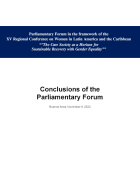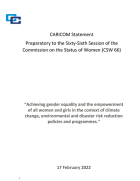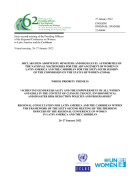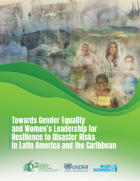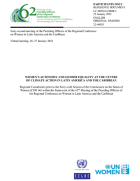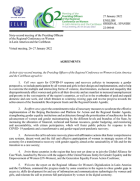1 - 20 of 24 Results
Pagination
Date:
Latin America and the Caribbean is in the midst of cascading crises that are deepening historical and structural inequalities and which disproportionately affect women. It is therefore urgent for the countries of the region to speed up progress towards achieving gender equality and the full exercise of the rights of women, adolescent girls and girls in all their diversity.
Date:
The Women, Local Economy, and Territories (MELYT) program implemented by UN Women, the United Nations entity dedicated to promoting gender equality and women's empowerment and funded by the Italian Ministry of Foreign Affairs and International Cooperation (MAECI), through the Italian Agency for Development Cooperation (AICS), promotes the economic empowerment of rural women for the development of strong local economies, more equitable societies, and a better quality of life.
Date:
Regional Consultation prior to the Sixty-Seventh Session of the Commission on the Status of Women, whose priority theme is “Innovation and technological change, and education in the digital era to achieve gender equality and the empowerment of all women and girls,” within the framework of the 64th Meeting of the Presiding Officers of the Regional Conference on Women in Latin America and the Caribbean.
Date:
Declaration of the Ministers and High Authorities of the National Machineries for the Advancement of Women of Latin America and the Caribbean for the 67th Session of the Commission on the Status of Women, whose priority theme is "Innovation and technological change, and education in the digital era to achieve gender equality and the empowerment of all women and girls" | Special Latin American and Caribbean Regional Consultation Session in the framework of the 64th Meeting of the Presiding Officers of the Regional Conference on Women in Latin America and the Caribbean.
Date:
The structural inequalities derived from the multiple interlinked crises, which exacerbate the limitations to women's autonomy, require legislative responses and transformative public policies to effectively move towards a care society, the conclusions of this document were highlighted.
Date:
This document has been drafted within the context, in 2022, of the 66th Session of the Commission on the Status of Women (CSW66), which will focus on the priority theme of “Achieving gender equality and the empowerment of all women and girls in the context of climate change, environmental and disaster risk reduction policies and programmes”. It provides the basis for a shared CARICOM position on the theme.
Date:
Declaration Adopted by Ministers And High-level Authorities of The National Machineries for the Advancement of Women in Latin America and the Caribbean for the Sixty-sixth Session of the Commission on the Status of Women (CSW66)
Date:
Reference document for the Latin America and the Caribbean Regional Consultation prior to the sixty-sixth period of sessions of the Commission on the Status of Women (CSW66), in the context of the 62nd Meeting of Presiding Officers of the Regional Conference on Women in Latin America and the Caribbean to be held on January 26-27 2022. This consultation is organized by the United Nations Entity for Gender Equality and the Empowerment of Women (UN Women) and the Economic Commission for Latin America and the Caribbean (ECLAC).
Date:
Women’s Autonomy and Gender Equality at the Centre of Climate Action in Latin America and the Caribbean
Date:
Agreements reached at the Sixty-second Meeting of the Presiding Officers of the Regional Conference on Women in Latin America and the Caribbean.
Date:
Education is essential for women to attain gender equality and become leaders of change. A girl or a woman who attends school is exercising her fundamental human right to education. She also has a great chance of reaching her full potential throughout life, as she will be better prepared for a decent, well-paid job. Although Chile is a country with high schooling rates compared to the regional and worldwide numbers, inequalities can still be observed in access to education for girls and...
Date:
Science and technology are sectors in rapid growth; they are vital to national economies and this means that STEM (Science, Technology, Engineering and Mathematics) skills have been identified as necessary for a country to remain economically competitive. In recent years, increasing digitalization has led to growing demand for professionals in technology fields, yet it is estimated that most of these positions will be occupied by men. After this, a survey for completion by companies that use...
Date:
Conducted within the scope of the “Win-Win: Gender equality means good business” programme, which is implemented by UN Women together with the International Labour Organization (ILO) and funded by the European Union (EU), this research aims to know the impact of sexist advertising on brand positioning.
Date:
This document compiles and analyses the main experiences and initiatives implemented to promote the participation of women and girls in the STEM sector in Latin America and the Caribbean.
Date:
Developed by UN Women, CIM and MESECVI, this practical legal guide brings together a systematic and analytical compilation of 130 judgments, decisions, and resolutions in paradigmatic cases, so that both civil society and public institutions -legislative, executive, and judicial- can count with tools for the cross-cutting application of the protection standards in force in International Human Rights Law, related to cases of gender-based violence against women. Violence against women in politics is included. (Note: The blurb should be a tiny, jargon-free description of the publication (ma
Date:
Building back better requires transforming the development model of Latin America and the Caribbean
Date:
This year’s regular resources report analyses how UN Women mobilized its core contributions in 2019 to fulfil its normative, coordination, and operational activities mandate, in order to improve the lives of women and girls worldwide. Through the presentation of tangible results, this report presents case studies at the global, regional, and country levels to showcase the impact that regular resources have in the countries where UN Women is present.
Date:
This report tells UN Women’s story over the period 2019–2020. It shares how we and our many partners are striding forward to realize a better world for women and girls—one of equality and empowerment. Looking forward, we will draw on our full resources and experiences in protecting and advancing the rights of all women and girls. That is what we do and who we are, as a leader, mobilizer, convenor, provider of programmes, and partner for change.
Date:
The links between biodiversity, climate change and gender are real and undeniable. In many places in Latin America and the Caribbean, the livelihoods of women and girls depend, in large part, on natural resources. They have a relationship with nature that is different from men’s, where we can observe different roles, knowledge, dependencies and contributions to conservation and sustainable management.
Date:
The Latin America and the Caribbean region has the highest levels of income inequality in the world, with wide gaps in living standards across countries, regions, sectors, and socioeconomic spheres. When coupled with the pervasive gender inequality that persists, the response to Covid-19 becomes immeasurably more complicated, finds a new report by CARE International and UN Women.



